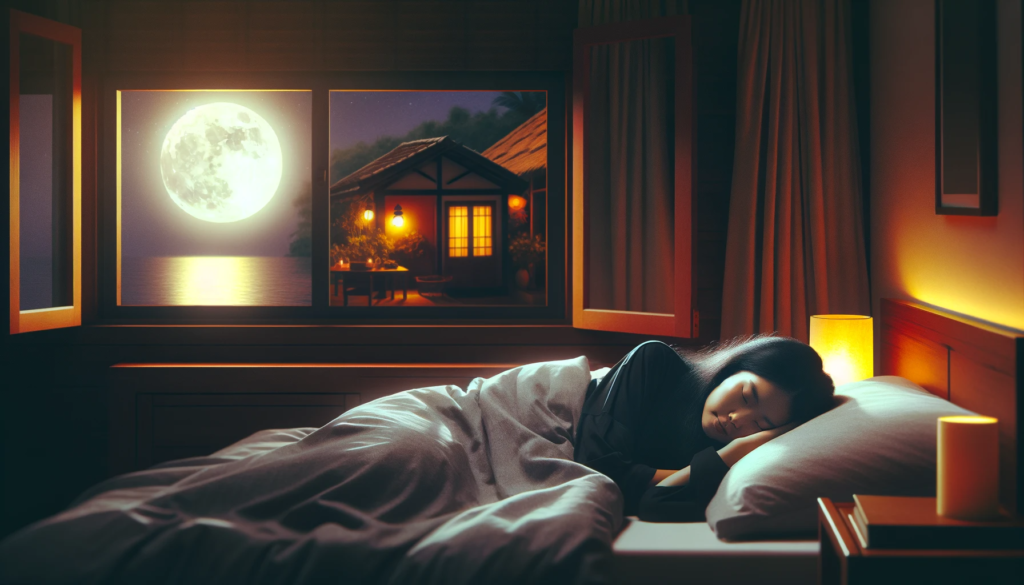Neste vídeo do canal do YouTube TED, aborda uma questão essencial: realmente precisamos de oito horas de sono todas as noites? Este exame detalhado desvenda as complexidades e os equívocos comuns relacionados às nossas necessidades de sono, destacando como a obsessão por um sono ‘perfeito’ pode paradoxalmente levar a mais problemas. O vídeo convida os espectadores a uma jornada de descobertas, oferecendo uma perspectiva baseada em evidências sobre este aspecto vital da nossa saúde e bem-estar, além dos gadgets e conselhos simplistas.
| Audio | |
|---|---|
Normal | Slow |
| English Transcript | Tradução |
| Sleep is so important. | O sono é muito importante. |
| We need it to live. | Precisamos dele para viver. |
| And when we can't sleep, we're desperate for help. | E quando não conseguimos dormir, estamos desesperados por ajuda. |
| But lately, our fascination with sleep feels as if it's taken on an urgency. | Mas ultimamente, nossa fascinação pelo sono parece ter adquirido uma urgência. |
| Do a quick internet search for sleep and you'll find a slew of articles about how to make your sleep perfect. | Faça uma rápida pesquisa na internet sobre sono e você encontrará uma série de artigos sobre como tornar seu sono perfeito. |
| New gadgets, fancy alarm clocks, stay away from blue light. | Novos gadgets, despertadores sofisticados, fique longe da luz azul. |
| There are lots of services, products and advice columns that tell us we're sleeping wrong. | Existem muitos serviços, produtos e colunas de conselhos que nos dizem que estamos dormindo errado. |
| Not enough, not quality sleep, wrong position. | Não o suficiente, não é sono de qualidade, posição errada. |
| Even worse, you might find scary messaging claiming that if you're not sleeping right your life is going to be shorter, you're going to get all kinds of diseases. | Ainda pior, você pode encontrar mensagens assustadoras afirmando que se você não dormir direito sua vida será mais curta, você terá todo tipo de doenças. |
| One of the biggest worries we have about our sleep is that we're not getting enough and that anything less than seven hours a night means that we’re doomed to bad health, everything from high blood pressure to Alzheimer’s disease. | Uma das maiores preocupações que temos sobre nosso sono é que não estamos dormindo o suficiente e que qualquer coisa menos que sete horas por noite significa que estamos condenados a uma saúde ruim, tudo desde hipertensão até doença de Alzheimer. |
| But there are two flaws with this kind of messaging. | Mas há dois problemas com esse tipo de mensagem. |
| The first flaw is that it's not completely accurate. | O primeiro é que não é completamente preciso. |
| Seven to eight hours of sleep, while recommended for adults, is just an average. | Sete a oito horas de sono, embora recomendado para adultos, é apenas uma média. |
| And while messages have to be simplified for health communication to the public, sometimes important nuances get lost. | E embora as mensagens tenham que ser simplificadas para a comunicação de saúde ao público, às vezes nuances importantes se perdem. |
| So yes, it's true that not getting enough sleep in the long term is associated with health problems like cardiovascular disease, diabetes and depression. | Então sim, é verdade que não dormir o suficiente a longo prazo está associado a problemas de saúde como doenças cardiovasculares, diabetes e depressão. |
| But fixating solely on seven to eight hours ignores the fact that there's a range of sleep that people need. | Mas fixar-se apenas em sete a oito horas ignora o fato de que existe uma variedade de sono que as pessoas precisam. |
| The duration of a good night's sleep can be different for different people. | A duração de uma boa noite de sono pode ser diferente para diferentes pessoas. |
| Some adults need eight, but some are just fine on six. | Alguns adultos precisam de oito, mas alguns estão bem com seis. |
| The second flaw with this kind of doomsday messaging is that it can be counterproductive, especially for people who do have trouble sleeping. | O segundo problema com esse tipo de mensagem apocalíptica é que ela pode ser contraproducente, especialmente para pessoas que têm problemas para dormir. |
| For instance, in 2019, it was estimated that 21 percent of adults in the US were wearing sleep tracking devices. | Por exemplo, em 2019, estimou-se que 21% dos adultos nos EUA estavam usando dispositivos de rastreamento do sono. |
| And that number is probably growing. | E esse número provavelmente está crescendo. |
| And I get it. | E eu entendo. |
| It's fascinating to see how much sleep you've gotten each night and to know what part of your night was spent in deep sleep or dreaming. | É fascinante ver quanto sono você teve cada noite e saber que parte da sua noite foi passada em sono profundo ou sonhando. |
| But having all of that sleep data is causing some people to become obsessed with it, so much so that it’s leading to a condition some call orthosomnia: a preoccupation with the constant need to achieve perfect sleep. | Mas ter todos esses dados de sono está fazendo com que algumas pessoas fiquem obcecadas por isso, tanto que está levando a uma condição que alguns chamam de ortossonia: uma preocupação constante em alcançar o sono perfeito. |
| And this condition, ironically, is causing more sleep problems. | E essa condição, ironicamente, está causando mais problemas de sono. |
| Now orthosomnia might be an extreme example, but the anxiety of not getting enough sleep is keeping some of us up at night. | A ortossonia pode ser um exemplo extremo, mas a ansiedade de não dormir o suficiente está mantendo alguns de nós acordados à noite. |
| So here's what some experts are saying. | Então, eis o que alguns especialistas estão dizendo. |
| Stop fixating on the number because that can lead to unrealistic expectations of sleep. | Pare de se fixar no número, pois isso pode levar a expectativas irreais de sono. |
| According to Dr. Colleen Carney, a psychologist and the head of the Ryerson University Sleep Lab, the basic questions you should ask yourself are: Do I feel reasonably well-rested during the day? | Segundo a Dra. Colleen Carney, psicóloga e chefe do Laboratório de Sono da Universidade Ryerson, as perguntas básicas que você deve se fazer são: Eu me sinto razoavelmente bem descansado durante o dia? |
| Do I generally sleep through the night without disturbances? | Eu geralmente durmo a noite toda sem perturbações? |
| Or, if I wake, do I fall back asleep easily? | Ou, se eu acordar, consigo voltar a dormir facilmente? |
| Can I stay awake through the day without involuntarily falling asleep? | Consigo ficar acordado durante o dia sem cair no sono involuntariamente? |
| If your answers are yes to all three, you probably don't need to worry about your sleep. | Se suas respostas forem sim para todas as três, provavelmente você não precisa se preocupar com seu sono. |
| And if you're struggling with your sleep, instead of buying expensive blue light filters or fancy sleep trackers, try talking with your doctor to make sure there aren't any medical conditions that need to be explored first. | E se você está lutando com seu sono, em vez de comprar filtros de luz azul caros ou rastreadores de sono sofisticados, tente conversar com seu médico para ter certeza de que não há condições médicas que precisem ser exploradas primeiro. |
| Then try evidence-based recommendations laid out by the American Academy of Sleep Medicine. | Depois, tente as recomendações baseadas em evidências estabelecidas pela Academia Americana de Medicina do Sono. |
| What's really cool is that there's a highly effective therapy called cognitive behavioral therapy for insomnia, or CBT-I, It doesn’t have any medications involved. | O que é realmente legal é que existe uma terapia altamente eficaz chamada terapia cognitivo-comportamental para insônia, ou TCC-I, que não envolve nenhum medicamento. |
| And it has a really low failure rate. | E ela tem uma taxa de falha muito baixa. |
Contagem de palavras
A tabela abaixo exibe as palavras encontradas neste texto, bem como o número de vezes em que aparecem.
Veja também: Para que serve esta tabela?
| Freq. | Palavra | Freq. | Palavra | Freq. | Palavra |
|---|---|---|---|---|---|
| 25 | sleep | 21 | to | 20 | is |
| 18 | the | 18 | of | 17 | that |
| 13 | are | 13 | and | 12 | it |
| 10 | a | 9 | not | 8 | you |
| 8 | with | 8 | for | 7 | your |
| 7 | we | 7 | I | 6 | some |
| 6 | night | 6 | need | 6 | do |
| 6 | but | 6 | be | 5 | there |
| 5 | so | 5 | if | 5 | have |
| 4 | people | 4 | or | 4 | on |
| 4 | in | 4 | enough | 4 | can |
| 3 | what | 3 | us | 3 | this |
| 3 | sleeping | 3 | seven | 3 | s |
| 3 | messaging | 3 | hours | 3 | health |
| 3 | getting | 3 | get | 3 | eight |
| 3 | an | 3 | all | 3 | adults |
| 3 | about | 2 | yes | 2 | wrong |
| 2 | without | 2 | while | 2 | was |
| 2 | try | 2 | through | 2 | therapy |
| 2 | stay | 2 | really | 2 | problems |
| 2 | probably | 2 | perfect | 2 | our |
| 2 | orthosomnia | 2 | number | 2 | much |
| 2 | might | 2 | make | 2 | light |
| 2 | kind | 2 | just | 2 | important |
| 2 | how | 2 | going | 2 | from |
| 2 | flaw | 2 | fixating | 2 | first |
| 2 | find | 2 | fancy | 2 | disease |
| 2 | different | 2 | day | 2 | condition |
| 2 | causing | 2 | blue | 2 | asleep |
| 2 | any | 1 | yourself | 1 | worse |
| 1 | worry | 1 | worries | 1 | will |
| 1 | who | 1 | when | 1 | were |
| 1 | well | 1 | wearing | 1 | wake |
| 1 | urgency | 1 | up | 1 | unrealistic |
| 1 | university | 1 | two | 1 | true |
| 1 | trouble | 1 | tracking | 1 | trackers |
| 1 | three | 1 | then | 1 | than |
| 1 | term | 1 | tell | 1 | talking |
| 1 | taken | 1 | t | 1 | sure |
| 1 | struggling | 1 | stop | 1 | spent |
| 1 | sometimes | 1 | solely | 1 | slew |
| 1 | six | 1 | simplified | 1 | should |
| 1 | shorter | 1 | services | 1 | see |
| 1 | second | 1 | search | 1 | scary |
| 1 | saying | 1 | ryerson | 1 | right |
| 1 | rested | 1 | recommended | 1 | recommendations |
| 1 | reasonably | 1 | re | 1 | rate |
| 1 | range | 1 | quick | 1 | questions |
| 1 | quality | 1 | public | 1 | psychologist |
| 1 | products | 1 | pressure | 1 | preoccupation |
| 1 | position | 1 | percent | 1 | part |
| 1 | out | 1 | one | 1 | obsessed |
| 1 | nuances | 1 | now | 1 | new |
| 1 | more | 1 | messages | 1 | medicine |
| 1 | medications | 1 | medical | 1 | means |
| 1 | low | 1 | lots | 1 | lost |
| 1 | long | 1 | live | 1 | like |
| 1 | life | 1 | less | 1 | leading |
| 1 | lead | 1 | lately | 1 | laid |
| 1 | lab | 1 | know | 1 | kinds |
| 1 | keeping | 1 | ironically | 1 | involved |
| 1 | involuntarily | 1 | internet | 1 | instead |
| 1 | instance | 1 | insomnia | 1 | ignores |
| 1 | highly | 1 | high | 1 | here |
| 1 | help | 1 | head | 1 | having |
| 1 | has | 1 | growing | 1 | gotten |
| 1 | good | 1 | generally | 1 | gadgets |
| 1 | flaws | 1 | fine | 1 | filters |
| 1 | feels | 1 | feel | 1 | fascination |
| 1 | fascinating | 1 | falling | 1 | fall |
| 1 | failure | 1 | fact | 1 | extreme |
| 1 | explored | 1 | experts | 1 | expensive |
| 1 | expectations | 1 | example | 1 | evidence |
| 1 | everything | 1 | even | 1 | estimated |
| 1 | especially | 1 | effective | 1 | easily |
| 1 | each | 1 | during | 1 | duration |
| 1 | dreaming | 1 | dr | 1 | doomsday |
| 1 | doomed | 1 | doesn | 1 | doctor |
| 1 | disturbances | 1 | diseases | 1 | diabetes |
| 1 | devices | 1 | desperate | 1 | depression |
| 1 | deep | 1 | data | 1 | counterproductive |
| 1 | cool | 1 | constant | 1 | conditions |
| 1 | completely | 1 | communication | 1 | columns |
| 1 | colleen | 1 | cognitive | 1 | clocks |
| 1 | claiming | 1 | cbt | 1 | carney |
| 1 | cardiovascular | 1 | cannot | 1 | called |
| 1 | call | 1 | by | 1 | buying |
| 1 | blood | 1 | biggest | 1 | behavioral |
| 1 | become | 1 | because | 1 | basic |
| 1 | based | 1 | bad | 1 | back |
| 1 | away | 1 | awake | 1 | average |
| 1 | at | 1 | associated | 1 | ask |
| 1 | as | 1 | articles | 1 | anything |
| 1 | anxiety | 1 | answers | 1 | american |
| 1 | alzheimer | 1 | alarm | 1 | advice |
| 1 | achieve | 1 | accurate | 1 | according |
| 1 | academy |










